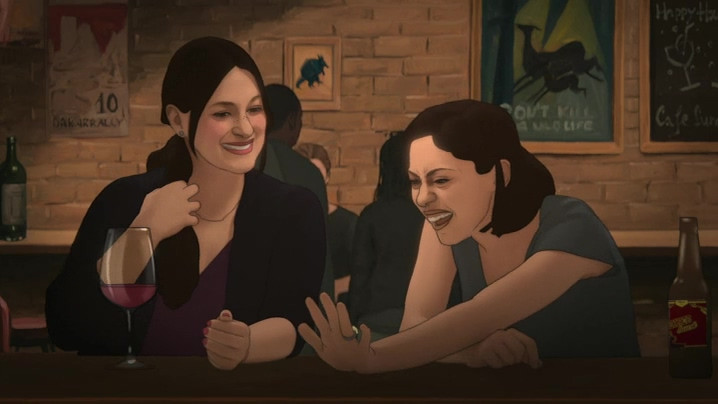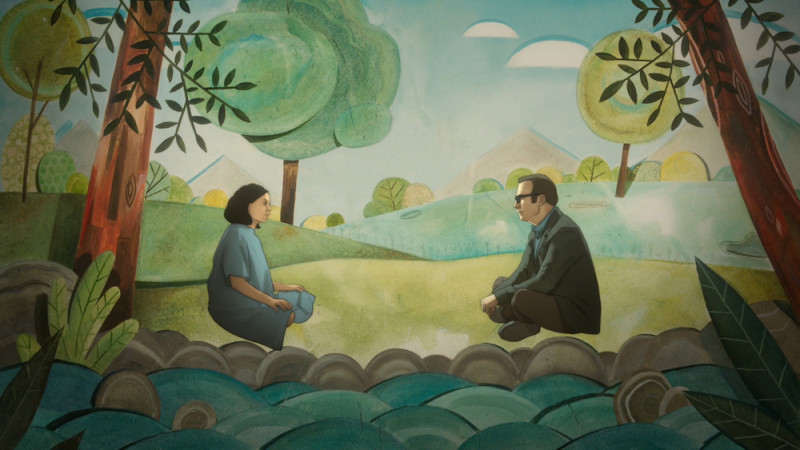
Undone is a series about schizophrenia. It treats this topic without holding any of its characters at arm's length. We are (nearly) always able to understand why each character's actions make complete sense to them, with the deep understanding that is almost the same as feeling.
(Spoilers beyond this point)
Lots of good fiction does this, but to accomplish it when one of your characters believes she can travel through time to save her dead father, and the others justifiably think she's crazy, is impressive. I'm not sure I've ever seen fiction about delusional mental illness that was so sympathetic to both sides.
How does the show do it? Undone is mostly seen through the eyes of its protagonist, Alma, a disaffected 28-year-old daycare worker. She and her goofy, laid-back boyfriend Sam have a loose alliance against the world as she sees it. She is angry about capitalism, angry about the subjugation of indigenous peoples. The world also includes her mother and her sister, who are traditional Catholics. Her sister is getting married soon. Alma feels choked by the easy routine her life has settled into, worried, after an offhand comment, that Sam wants to settle down, become just like other couples. She feels the presence of her dead father, memorialized in the first part of "Winograd-Diaz", the name that she and her sister share. He was a professor, a tall eccentric dad-presence, maker of weird impromptu rhymes and jokes, who died in an accident when she was young. She feels like something is missing.
Alma is having a bad day, driving too fast, and out the car window sees the ghost of her father by a stop sign. Distracted, she crashes the car and wakes up in the hospital. Something that surprised me about the show here is just how much of it is dream sequence. An entire episode is spent inside Alma's perception of reality as she lies upon the hospital bed, as time goes backwards and forwards and she is led through the hallways by her father, trapped by sheets descending from the ceiling. Then she'll be back in bed having a normal conversation with her sister for a minute, but after that the altered world again, and so on, going in and out like a tide.
Lots of fiction has "dream sequences" — events only the protagonist can experience, where the scenery becomes rife with symbolism, where the world foregoes its normal rules and gives itself over to the chains of association that occur in our dreams. Star Wars, for example, has that scene where Luke battles Darth Vader in the cave, and cuts off Darth's head to reveal it is his own. But that's the only such sequence in Star Wars, it occurs in a specific location (Dagobah) and it clearly corresponds to a real event which occurs later (the actual battle between them.) In Undone, the dream sequences occur very frequently, almost as often as "reality" in some episodes, and they look backward to previous events, not forward to serve as prophecies.

I think it's crucial that they occur so often — and consequently, that we spend so much of the show inside Alma's head. When we're watching a show and we know a character is delusional, we apply a discount to their experiences. That's what it means to know something is a delusion. We intuitively give more weight to experiences that we think correspond to reality, because we're trying to figure out reality. This makes a lot of sense and isn't bad. But since when Undone holds us strictly to Alma's point of view for an episode or so, we become starved for "reality" and eventually just have to accept what we're given. This is reality. We feel distress at having to accept that; Alma feels that distress too.
Multiple other features of the show contribute to a feeling of being "locked into" Alma's experience. The fact that most scenes are from her perspective or involve her — e.g. we don't see Tunde calling Sam to say he's worried about Alma's work behavior, we see Alma walking over to the living room to encounter Sam, who lets slip that this has happened. When Alma takes off her hearing aid, the whole show's sound is reduced to a murky underwater mumble. I remember when Alma locks herself in the bathroom while Sam is apologizing through the door at her; exhausted by him, she simply takes out her hearing aid and neither her nor the viewer can hear what he's saying anymore.
So in order to make all its characters equally sympathetic, the show has to be unequal in it distribution of time, favoring Alma. But I think another key to the show's success is Sam. Sam is a pure being. If Alma lived alone and only her mother and sister were trying to support her, the lines would be drawn too easily: nontraditional lifestyle, goofy sarcasm, and schizophrenia would face off against marriage, repressed emotions, and taking your pills so we can be a normal family. Sam is so clearly not like Alma's mother or sister, and so clearly just loves her for who she is and wants her to be happy, that he lends credence to the whole world that isn't in Alma's head. He makes us see "you have a mental illness, please see a doctor" something that can be said out of genuine concern, without mixing in scorn or fear. He is also a strong, likeable character in his own right — "the Sam show" would be pretty different than Undone, but I'd want to watch it.
Closing thoughts: The show is animated in a unique way (it's rotoscoped, so recordings of the actors in scenes are drawn over to produce the frames), and I feel the need to comment on that, but I can't think of any ways that my experience of the show would have differed had it been live action. I suppose the borders between "reality" and "not reality" may have been more obvious with conventional special effects. The show is also not perfect: I felt it erred in its treatment of Reed and his family, who are treated as plot or comic relief and don't get the kind of humanization the show gives to the rest of its characters.